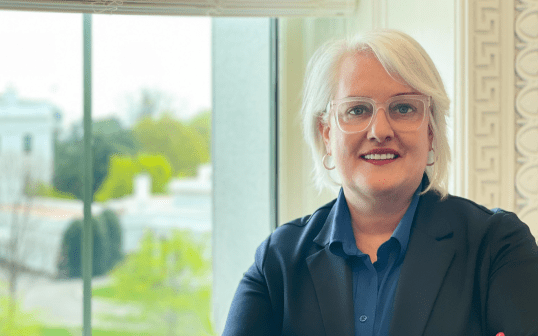Mobile leaders to agencies: Think beyond apps and the network

Gen. David Cotton, deputy CIO for information enterprise at the Department of Defense, kicks off the fifth Annual MobileGov Summit.
The pervasive role of mobile devices in the world continues to place growing demands on government and agency officials to think more creatively about mobile services, according to nearly two dozen federal and industry IT leaders who spoke at Wednesday’s fifth annual MobileGov Summit.
“We need to get out of our bunker … build things to last, not just to launch … and embrace what makes us government,” said Gwynne Kostin, director of the Digital Services Innovation Center at GSA’s Office of Citizen Services and Innovative Technologies/18F.

GSA’s Gwynne Kostin (FedScoop)
But she urged the audience of government and industry IT officials to capitalize on, and not get distracted by, technology.
The exponential convergence of computing power, storage and the cloud, which is driving the increased capabilities of mobile devices, is helping to create a new environment for innovation, she said at the event, which was presented by FedScoop. And unlike companies competing in the private sectors, government agencies can share ideas freely, she said.
She noted the 2014 iPhone has more than 240,000 times the computing power of the 1977 Voyager 1 spacecraft, and that storage has become 19,000 times cheaper between 1999 and 2012.
She suggested embracing the power of crowds and looking at new business models, the way ride service Uber created the largest taxi business in the world without owning a single car. Kostin also stressed the importance of creating solutions built on open source tools that can continue to evolve with the market.

Sonny Hashmi, GSA CIO (FedScoop)
Sonny Hashmi, in his last week as General Services Administration CIO before
leaving to join Box, also stressed the importance of moving beyond the industrial-era business models of the past and embracing the new creative-era that calls for agility and collaboration.
He warned the audience to avoid the fate of companies like Blockbuster, Yellow Pages and Yellow Cab that succeeded by perfecting processes for business models that technology made obsolete.
He also offered five principles to staying innovative:
- Design your future around the user experience.
- Identify and build for the mobile moments in your users’ journey map.
- Embrace the “Lego” model, buying standardized APIs and technology building blocks rather than building systems from scratch.
- Build your geek army, acquiring the technical talent to stay agile.
- Learn to take effective risks.
GSA’s new associate administrator of the Office of Citizen Services and Innovative Technologies/18F and GSA’s chief customer officer, Phaedra Chrousos, put mobile government solutions in a different light.
Too often she said, CIO shops come to her agency assuming that what they need is a mobile app. Instead, agencies should focus on the users and determine what they need.
“We’re really looking to be responsive to our customers’ needs, not just focus on a mobile device or a mobile app, per se,”
said Chrousos, who FedScoop recently named one of D.C.’s Top 50 Women in Technology.

(From left) Joe Paiva, International Trade Administration CIO, and Nigel Ballard, Intel (FedScoop)
International Trade Administration CIO Joe Paiva, in a discussion led by Intel Director of Federal Marketing Nigel Ballard, put the future for mobile strategy in starker terms. “Forget defending the network,” he said bluntly.
As more data flows over public networks, it will be impossible keep up with network security breaches. The focus instead needs to be “about protecting and encrypting my data.”
Paiva said ITA employees use one Windows-based tablet and one smartphone – and he assumes they are not secure. “We do the best we can to secure devices, but we have to accept … it’s never going to be secure. So I don’t trust them.”

(From left) Don Turner, DOD sales engineering manager for Avaya; Wolf Tombe, CTO for DHS’ Customs and Border Patrol; Ted Henderson, founder of Capitol Bells (FedScoop)
He was also adamant that government shouldn’t buy, own or manage commodity IT, but rather focus on managing its information assets to flow securely over commercial networks.
BlackBerry President of Global Sales John Sims struck a similar note, stressing the importance of “taking a true end-to-end view of mobile … with a zero-trust mentality.”
At the same time, mobile is creating new opportunities unimagined a few years ago.
Wolf Tombe, chief technology officer for Customs and Border Protection within the Department of Homeland Security, sketched out how mobile apps, built into consumer wearables, such as protective vests, could help better protect his agency’s agents.
Imagine, he said, if a law enforcement officer was shot, and his vest could send out a signal telling dispatch where he’s been hit, or if an officer’s wristband could beam vital health data to EMTs en route to treat her.
“These technologies are out there,”
he said.

Paige Fitzgerald, WAZE, and Richard McKinney, Department of Transportation CIO (FedScoop)
Another area of discussion was the need for more uniform data standards. Department of Transportation CIO Richard McKinney and Paige Fitzgerald, manager for citizen data at the popular traffic app WAZE, talked about the coming tidal wave of mobile data from cars.
“As we move into connected vehicles, there will just be so much more data available,” said Fitzgerald. “We envision WAZE eventually being a part of a
mobility platform” for government data sharing, she added.
“The data that we’re dealing with right now will just pale in comparison to the amount of data” in the future, McKinney said. That’s one of the reasons DOT was the first Cabinet agency to establish a chief data officer.

David Bray, FCC CIO (FedScoop)
David Bray, CIO of the Federal Communications Commission, reminded attendees that they would continue to help chart the future of mobile technology, painting a picture of world still rapidly unfolding.
“We’re bravely mapping terra incognita — unknown world,” said Bray, referencing a D.H. Lawrence poem of the same name.
Between 2014 and 2019, the number of mobile broadband data exchanges per month will increase from 2.5 exabytes to 24.3 exabytes, he said. That’s the same as 6,079 million DVDs’ worth of data, according to the Cisco’s Visual Networking Index Mobile Forecast Highlights
report.
At the same time, as technology develops, threats will grow exponentially and touch all sectors, he said, noting that McAfee Labs
finds more than 200 Internet threats each minute, he said.
Whitney Wyckoff and Corinne Lestch contributed to this story.






